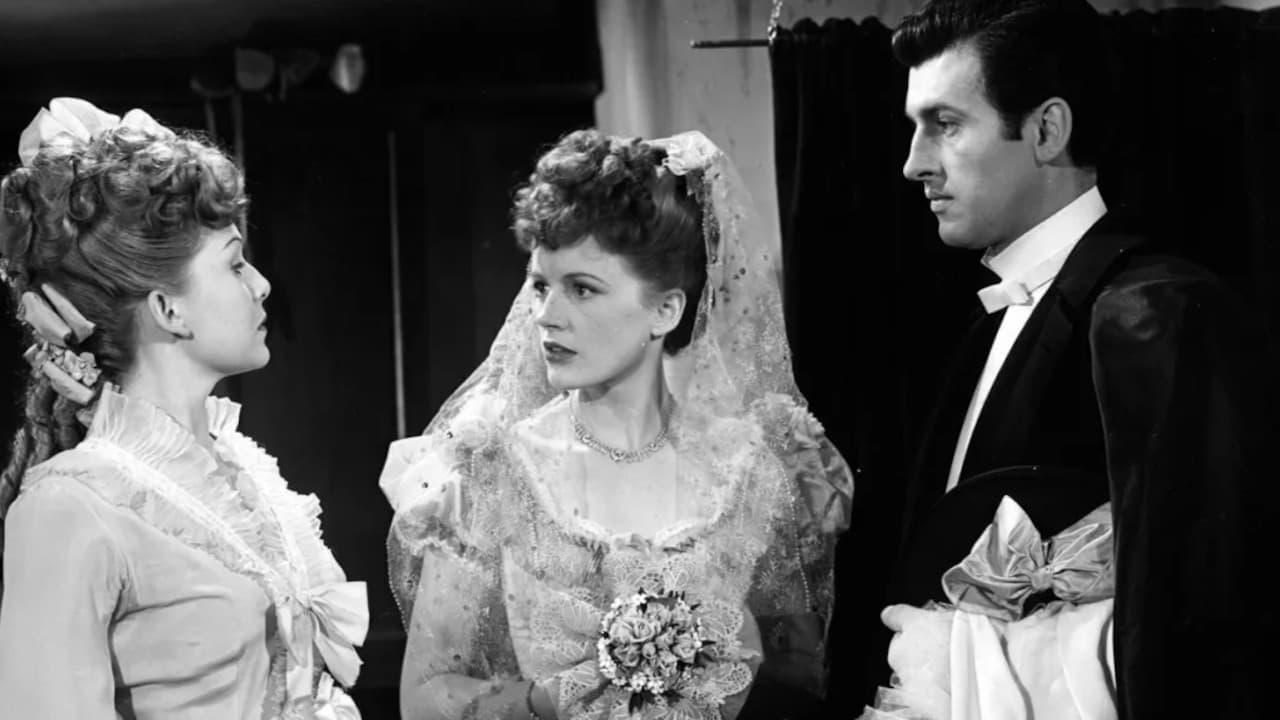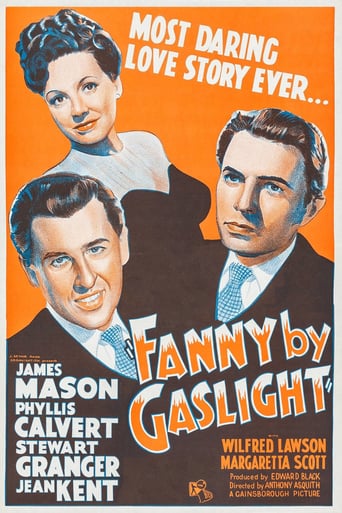Stellead
Don't listen to the Hype. It's awful
Chirphymium
It's entirely possible that sending the audience out feeling lousy was intentional
Livestonth
I am only giving this movie a 1 for the great cast, though I can't imagine what any of them were thinking. This movie was horrible
Grimossfer
Clever and entertaining enough to recommend even to members of the 1%
Alex da Silva
Ann Stephens (Fanny) is sent to boarding school and returns home as Phyllis Calvert (Fanny) to look after her family. However, things take a turn when her true identity is revealed. According to the morals of the day, this becomes a burden to her which she must either accept and toe the line or rebel against. Both options lead to unhappiness. Or do they? The story is saved by philandering gentleman James Mason (Lord Manderstoke) who makes his entrance in the film with a wonderful delivery of the line "Get out of my way". Unfortunately, we don't get enough of Mason. Other cast members are good but Calvert and rising political star Stewart Granger (Harry) are pretty lucklustre with other characters outshining them. There are some good scenes and the film builds towards an inevitable showdown between Mason and Granger but it never really breaks into stride. It's a bit boring and has an unsatisfying predictability.
writers_reign
Puffin Asquith was one of the finest English film directors in the mid twentieth century but he was most at home in contemporary settings, working especially fruitfully with Terence Rattigan. He was, therefore, not an ideal choice for Victorian soap opera and unfortunately it shows. One can understand the thinking at Gainsborough, they'd hit one out of the park with The Man In Grey when they'd intended only a bread-and-butter entry so they were anxious to follow it with more of the same while the iron was still hot. Accordingly they wheeled out James Mason (and promptly under-used him), Phyllis Calvert and Stewart Granger, with Jean Kent and Wilfrid Lawson thrown in for good measure. It was barely credibly in 1944 in the middle of a war and today there seems no excuse for it. On the other hand it's always nice to see Mason.
Jem Odewahn
The second Gainsborough costume melodrama (rushed into production after the huge, unexpected success of Regency romance THE MAN IN GREY)is a more sober work than it's predecessor. Set in the constricting Victorian class system, FANNY seems to be striving for greater realism than THE MAN IN GREY, in part due to the critical whipping of the former film as "trash". Three of of GREY's main line-up return: Phyllis Calvert (playing put-upon heroine Fanny), Stewart Granger (Harry) and the one, the only James Mason (Lord Manderstoke). As with GREY and MADONNA OF THE SEVEN MOONS, the film engages in doubling of it's characters to make it's point. FANNY depicts a Victorian England that is polite and pretty on the outside, yet teeming with moral decay on it's underbelly. From the opening shot where a young Fanny rolls a ball into her father's The Shades (a den of inequity), good/bad, poor/wealthy, innocence/depravity is juxtaposed. Fanny herself is not immune to this, as, after her father (John Laurie) is killed by Lord Manderstoke (who gets off easily at the fixed trial), she discover he's not really her father at all, and she is actually the illegitimate product of a love affair between her mother and a man who is now a high-ranking politician. Her biological father secretly arranges for Fanny to live with him, and in time reveals himself. However, personal and public lives collide as his horrible wife (who is having an affair with Manderstoke)threatens to expose him if her doesn't give her a divorce. He commits suicide, and Fanny is left with no-one to turn to but the dashing Harry...and Lord Manderstoke still lurks ominously in the background... Calvert again catches the audience's sympathy as Fanny- she, like Olivia de Havilland, could make these heroines believable. Granger seems to be lacking most of the screen presence and charisma he brought to THE MAN IN THE GREY (where he and Calvert made a lovely couple), perhaps it is his stuffy role as the obligatory romantic hero. Mason dominates every scene he appears- sexy, sadistic, sardonic, cruel yet possibly sympathetic as Manderstoke. His sadistic charm is best illustrated in a great scene with the adulterous wife- Wife: Really, don't you care for me AT ALL? Mason: (Looking up at her, while twirling a flower in his fingers)No. (This is said in his inimitable voice). He is completely dastardly, yet at the same time, irresistibly attractive. Jean Kent gets one of her early key roles as Lucy, Fanny's childhood friend who offers herself to Manderstoke. The doubling is reminiscent of THE MAN IN GREY (Lockwood and Calvert), yet Lucy is much less callous than Hesther. Instead, she's a victim of Victorian society and her own weaknesses.
sandra small
Fanny by Gaslight is an inspirational film, in that it is willing to take risks with the subject matter which not only questions British morals, but exposes its hypocrisy regarding them! James Mason illustrates the depth of his talent, and makes the film all the more worth watching.Fanny being the epitome of Victorian double standards illustrates to us why the feminist movement came into being. Her oppression eventually produces a rebellious woman in that she agrees to marry Harry just to be defiant, rather than to conform to the man-made idea of marriage. Therefore, Fanny's decision to marry Harry is not meant to produce a cliché happy ending. In this respect the producers of this controversial film are taking more risks. It is that they are willing to take risks with this film that the producers need recognition. It is about time contemporary film producers, directors etc. were willing to do the same instead of playing it safe, culminating in producing very bland films which are an insult to the art. By doing this, the only risks contemporary film makers are taking is that of loosing audiences.. This void will be filled by French film producers etc. who have already spotted the gap in the art of film making, and are filling it fast!

